JoRC
Nov. 2, 2026
Events : JoRC
Oct. 15, 2026
Events : JoRC
Feb. 21, 2025
Events : JoRC
► Référence complète : Journal of Regulation & Compliance (JoRC) and Institut de Recherche Juridique de la Sorbonne (André Tunc - IRJS), Durabilité de l’Internet : le rôle des opérateurs du système des noms de domaine. Compliance et Régulation de l’espace numérique (Sustainability of the Internet: the role of the operators of the domain name system. Compliance and regulation of the digital space), Paris 1 Panthéon Sorbonne University, 21 February 2025
____
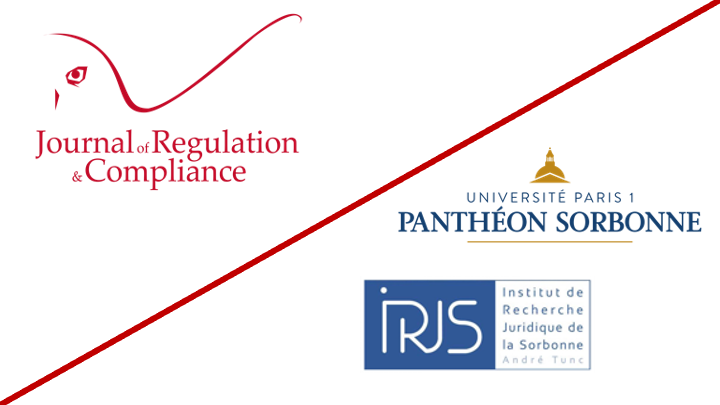
____
► The symposium is organised by the Journal of Regulation & Compliance (JoRC) and the Institut de Recherche Juridique de la Sorbonne (André Tunc - IRJS) of Paris 1 Panthéon-Sorbonne University.
The symposium is held under the scientif supervision of 🕴️Marie-Anne Frison-Roche and 🕴️Grégoire Loiseau.
____
► Presentation ot the theme: The digital space has been built on and as a system. Its primary interest is of a negative nature: it consists of to be preserved against the prospect of systemic failure, of not collapsing. Like all other systems, this 'Monumental Goal' specific to the digital system justifies resources that incorporate this concern for the future. As with all systems, it integrates and relies on the specific technical nature of this system.
The digital space is largely based on the invention, technology and architecture of domain names. Domain names, as an addressing system, enable users to enter the digital space and find other Internet users. The uniqueness and solidity of the domain name system, entrusted to a single root and decentralisation, makes this community possible for those who use the digital space and ensures the technical durability required, without which the digital space would be compromised.
The architecture, operation, operators and what they do under the control of legislators, regulators, judges and legal subjects are therefore examined from a dual technical and legal perspective, in the light of the imperative of sustainability.
This allows to progress in 4 stages.
Firstly, to examine the permanence in time and space of the domain name system, insofar as it is the foundation of the Internet and the digital system. This technical construction gives rise to legal qualifications, not only for the present but also for the future, since the Web3 offers new technical solutions.
Secondly, this technical sustainability is an imperative that is built into the operators of the domain names themselves, which are inter-linked not only at national level but also at global level, this cross-linking being necessary for the security of the system. The State is present through public law techniques that enable surveillance, control and possible recovery.
Thirdly, it imposes constraints on the operators subject to them in order to serve this monumental goal of technical sustainability, and these constraints themselves generate as many powers as they need to usefully achieve this mission. This proportionality must be at the heart of the method and the requirements. The relationship between constraints and powers also stems from it.
Fourthly, this imperative of technical sustainability, which is global in nature, gives way to imperatives of societal sustainability, more localised in space and time, when domain name operators are called upon by the legitimate authors of binding standards, legislators in the first instance, to express concerns such as the protection of people involved in the digital space and whose rights are compromised or who are in danger.
This second type of sustainability, which is more localised and less inherent in the architecture of the Internet, is justified by the available power of the operators concerned and their adherence to social imperatives. The resulting constraints and powers are therefore not the same.
The 2 sustainabilities must then be articulated in a conception that is both teleological and pragmatic.
____
To register for a physical presence: Cliquer HERE
To register for an online presence: Cliquer HERE
🧮The event will take place at the Paris 1 Panthéon-Sorbonne University, 12 place du Panthéon 75005, in Room 6, on 21 February 2025.
____
► Speakers:
🎤Pierre Bonis, Chief Executive Officer of the Association française pour le nommage Internet en coopération (Afnic)
🎤Lucien Castex, Adviser of the Afnic Chief Executive Officer for Research internet and society and Internet governance
🎤Marie-Anne Frison-Roche, Full Professor of Regulatory and Compliance Law, Director of the Journal of Regulation & Compliance (JoRC)
🎤Claire Leveneur, Senior Lecturer at Paris-Est Créteil University
🎤Grégoire Loiseau, Full Professor at Paris 1 Panthéon-Sorbonne University
🎤Samir Merabet, Full Professor at the University of West Indies
🎤Antoine Oumedjkane, Senior Lecturer at Lille University
🎤Frédéric Sardain, attorney at law, Jeantet law firm
____
🔻Read a detailed presentation of the event below:
Feb. 9, 2024
Events : JoRC
► Full Reference: Journal of Regulation & Compliance (JoRC) and Institute of World Business Law of the ICC (Institute), L'arbitrage international en renfort de l'obligation de Compliance (International Arbitration in support of the Compliance Obligation, Conseil Économique Social et Environnemental, Paris, February 9, 2024
____
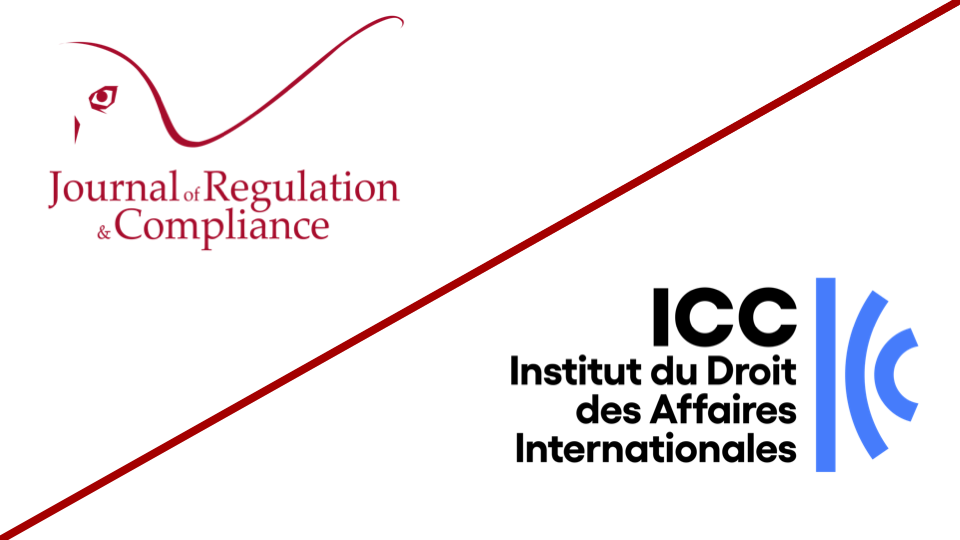
____
🏗️ This symposium takes place in the cycle of symposiums organised by the Journal of Regulation & Compliance (JoRC) and its Partner Universities, focusing in 2023-2024 on the general theme of Compliance Obligation.
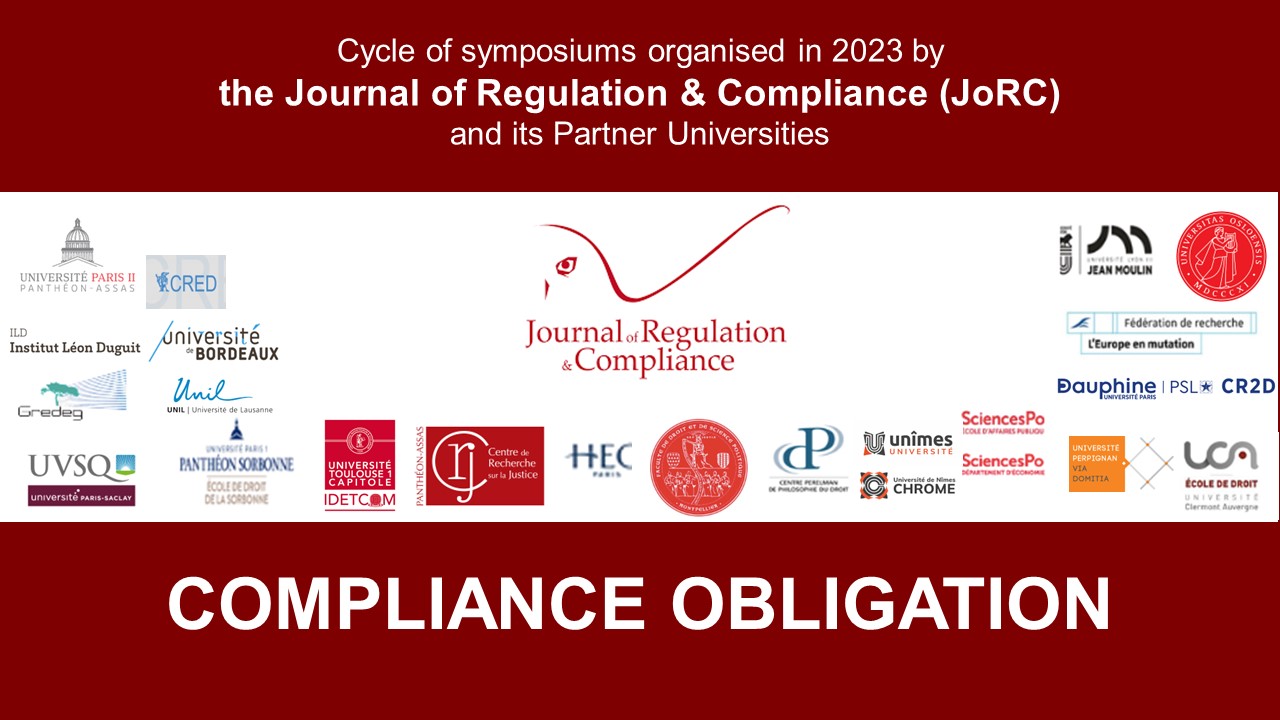
____
► The symposium is organised by the Journal of Regulation & Compliance (JoRC) and the Institute of World Business Law of the ICC (Institute).
The manifestation is under the scientific coordination 🕴️ Laurent Aynès🕴️Marie-Anne Frison-Roche, 🕴️Jean-Baptiste Racine. and🕴️Eduardo Silva-Romero.
It will be held in French and in English.
To registrer for following on site and online: anouk.leguillou@mafr.fr (please specify in your e-mail whether you wish to attend the event on site or online)
As places are limited, you will be asked to confirm 48 hours in advance
🧮The event will take place at the Conseil Économique Social et Environnemental, 9, place d’Iéna, 75116 Paris, on February 9, 2024, between 9 am and 12.45 pm.
_____
► Presentation of the topic: "Compliance Obligation" appears to be far from International Arbitration if Compliance Law is only understood in terms of binding regulations or even Criminal Law. Arbitration would only have contact with Compliance Obligation in a repulsive way, when a person claims to have enforced a contract before an arbitration court that disregards a compliance prohibition, e.g. corruption or money laundering. It is therefore from a negative angle that the cross-over has taken place.
The fact that Arbitration Law respects the requisite of Criminal Law is nothing new. Moreover, the power of Compliance in its detection and prevention tools, particularly in terms of evidence, no doubt increases the global efficiency.
But Compliance Obligation is based on Monumental Goals, notably linked to global human rights and active ambitions about environment and climate which, particularly in the value chain economy, take the legal form of compliance clauses, or even compliance contracts, or various commitments and plans, which the parties can ask the international arbitrator to enforce. They will do so even more as arbitrators are often the only international, or even global, judges available.
The use they will do of Contract Law, Quasi-Contract Law, Enforcement Law, Tort Law, reinforces Compliance Law in a global dimension.
____
The symposium, and the articles following, will expose the crucial global movement that starts. l
_____
Speakers:
🎤 Laurent Aynès, emeritus professor of Law at Paris 1 Panthéon-Sorbonne University, attorney, Darrois Villey Maillot Brochier law firm (Paris)
🎤 Marie-Anne Frison-Roche, professor of Law, director of the Journal of Regulation & Compliance (JoRC)
🎤 Jean-François Guillemin, former General Secretary of the Bouygues Group
🎤 Christophe Lapp, attorney, Advant Altana (Paris)
🎤 Jean-Baptiste Racine, professor of Law at Paris Panthéon-Assas University (Paris 2)
🎤 Eduardo Silva-Romero, president of the Institute of World Business Law of the ICC (Institute), attorney, Wordstone (Paris)
____
The symposium work will be the basis of complete chapters in the books:
📕 L'obligation de compliance, to be published in the collection 📚Regulations & Compliance, copublished by the Journal of Regulation & Compliance (JoRC) and Dalloz.
📘Compliance Obligation, to be published in the collection 📚Compltiance & Regulation, copublished by the Journal of Regulation & Compliance (JoRC) and Bruylant.
🔻 read une first presentation of the manifestation below ⤵️
Dec. 5, 2023
Events : JoRC
► Full Reference: Journal of Regulation & Compliance (JoRC) and Institut de Recherche Juridique de la Sorbonne (André Tunc - IRJS) of Paris 1 Panthéon-Sorbonne University, La Vigilance, pointe avancée de l'Obligation de Compliance (Vigilance, advanced point of the Compliance Obligation), Paris 1 Panthéon-Sorbonne University, December 5, 2023, 12 place du Panthéon, salle 6.
____
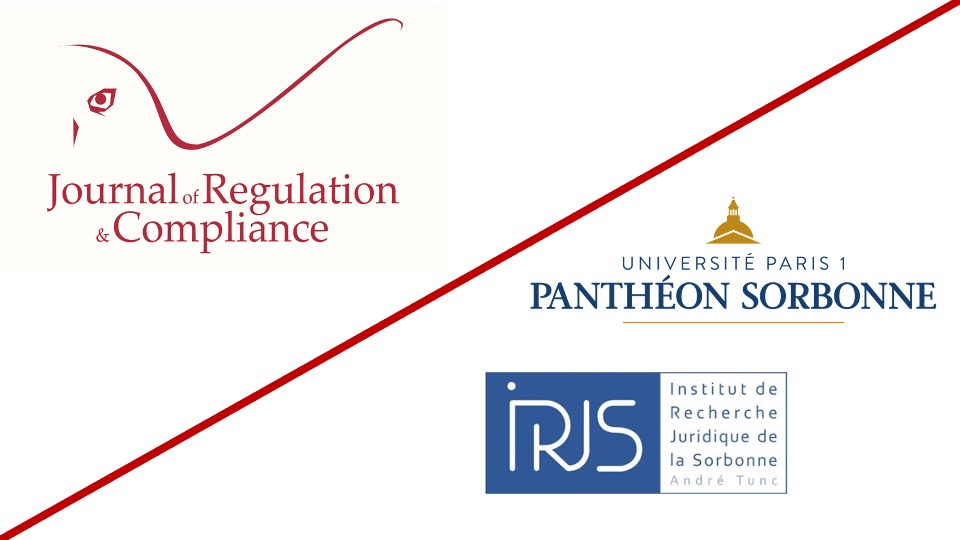
____
🏗️ This symposium takes place in the cycle of symposiums organised by the Journal of Regulation & Compliance (JoRC) and its partner Universities, focusing in 2023 on the general theme of Compliance Obligation.
____

____
► This symposium is organised by the Journal of Regulation & Compliance (JoRC) and Paris 1 Panthéon-Sorbonne University, through its Institut de Recherche Juridique de la Sorbonne (André Tunc - IRJS).
This symposium is held in French.
the symposium is under the scientific direction of 🕴️Marie-Anne Frison-Roche, 🕴️Mustapha Mekki , and 🕴️Jean-Christophe Roda.
____
To register for a physical presence: anouk.leguillou@mafr.fr (as places are limited, you will be asked to confirm 48 hours in advance).
To register for an online presence, via Zoom: Click HERE
🧮 The event will take place at Paris 1 Panthéon-Sorbonne University, 12 place du Panthéon 75005, in Salle 6, on 5 December 2023.
____
► Présentation of the theme : The Vigilance Obligation is difficult to define because of the multiplicity of texts and cases in which it can be understood. This is particularly true of the Vigilance mechanism, which illustrates, and even emphasises, the Vigilance Obligation. Through international texts, French law and European texts that have been adopted or are in the process of being adopted, the constraints of vigilance, but also the structures and actions that companies have put in place and the actions that stakeholders have taken, Vigilance has highlighted aspects of the Compliance Obligation, and even modified it.
The revelatory effect thus produced and the movement thus unleashed, whose roots run deep and whose systemic effects are very significant, justify a greater focus on mechanisms that are interconnected, whereas they are sometimes perceived in silos, which makes it difficult to understand the whole picture. In the same way, because Vigilance is the advanced point of the Compliance Obligation, we can better distinguish and articulate what is sector-specific, in particular in banking and finance or in digital matters, and articulate them with what Vigilance has, like Compliance, of a more general nature. What's more, the intensity of Vigilance varies according to its ambitions and the position of the company subject to it, which is reflected in the variations in legal qualification, ranging from a duty to a criminally sanctioned obligation.
The different legal systems reflect these developments in their legislation, case law and the practice of companies and stakeholders in specific ways, because these different techniques express standards of behaviour and accountability, which are directly reflected in evidential requirements, concepts of responsibility and institutional translations through possible regulatory bodies.
As a result, the symposium is divided into three parts. After a general introduction on the systemic relationships between Vigilance and Compliance, the first part will focus on the variation in Vigilance Intensities, the advanced point of Compliance, the second part will look at the Tensions that Vigilance generates or exacerbates, and the third part will look at the Modalities that Vigilance uses in Compliance systems.
____
The proceedings of this colloquium will form the basis of one chapter in the books:
📕L'obligation de Compliance, in the collection 📚Régulations & Compliance, copublished by the Journal of Regulation & Compliance (JoRC) and Dalloz.
📘Compliance Obligation, in the collection 📚Compliance & Regulation, copublished by the Journal of Regulation & Compliance (JoRC) and Bruylant.
____
Speakers:
🎤Laurence Dubin, Professor at Paris 1 Panthéon-Sorbonne University
🎤Marie-Anne Frison-Roche, Professor of Regulatory & Compliance Law, director of the Journal of Regulation & Compliance (JoRC)
🎤Bernard Haftel, Professor at Paris-Nord University
🎤Marie Lamoureux, Professor at Aix-Marseille University
🎤Grégoire Loiseau, Professor at Paris 1 Panthéon-Sorbonne University
🎤Véronique Magnier, Professor at Paris-Saclay University
🎤Gilles J. Martin, Emeritus Professor at Côte d'Azur University, member of the Groupe de Recherche en Droit, Économie, Gestion (GREDEG) of the CNRS
🎤Mustapha Mekki, Professor at Paris 1 Panthéon-Sorbonne University
🎤Jean-Christophe Roda, Professor at Jean Moulin Lyon 3 University
🎤Anne-Claire Rouaud, Professor at Paris 1 Panthéon-Sorbonne University
____
🔻 read a detailed presentation of the manifestation below 🔻
Nov. 30, 2023
Events : JoRC
► Full Reference: Journal of Regulation & Compliance (JoRC) and Conseil national des Barreaux (CNB), Compliance, vigilance et médiation (Compliance, Vigilance and Mediation), November 30, 2023, Amphithéâtre du Conseil national des barreaux.
____
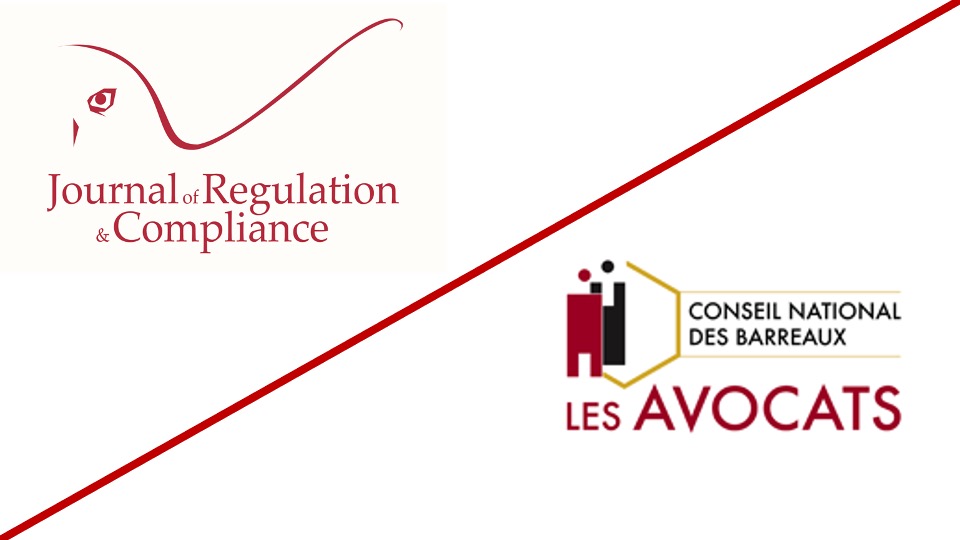
____
► The symposium is organised by the Journal of Regulation & Compliance (JoRC) and the Conseil national des barreaux (CNB).
This symposium is held in French.
The symposium is placed under the scientific direction of 🕴️Matthieu Boissavy, 🕴️Hirbod Dehghani-Azar and 🕴️Marie-Anne Frison-Roche.
____
► Presentation of the theme: To increase respect for human rights and the environment in the context of corporate social responsibility and compliance, public authorities and companies have for several years been implementing instruments and processes for dialogue between companies on the one hand and stakeholders inside and outside the company on the other. Among these, mediation is regularly highlighted as a necessary and fruitful process for reaching agreements that benefit employees and civil society players, as well as the environment and society as a whole.
John Ruggie, Special Representative of the Secretary-General on human rights and transnational corporations and other business enterprises, in his report of 21 March 2011, Guiding Principles on Business and Human Rights, recommends mediation as an effective and appropriate non-judicial grievance mechanism. The ISO 26000 standard on social responsibility also explicitly refers to the use of mediation in the section Actions and related expectations (6.3.2.6) and say that an organisation should establish or ensure the availability of redress mechanisms for its own use and for that of its stakeholders. For these mechanisms to be effective, they should be [...] based on dialogue and mediation: the process should aim to remedy breaches through mutually agreed solutions reached through dialogue between the parties. Where a judgment is desirable, the parties should retain the right to reach it through separate, independent mechanisms.
Similarly, the French law No. 2017-399 of 21 March 2017 relative au devoir de vigilance des sociétés mères et des entreprises donneuses d’ordre (on the duty of vigilance of parent companies and ordering companies) has given rise to disputes relating to the design and application of vigilance plans by certain companies subject to this law. Mediation has been proposed by the courts, sometimes accepted, and we know that some have been successful.
At the same time, the draft European Directive on Corporate Sustainability Due Diligence (CS3D) is likely to impose or extend obligations relating to the duty of vigilance on a large number of companies in the European Union, for the respect of human rights and the environment by companies in global value chains.
The result of all this is that respect for human rights within organisations and companies depends on recourse to the courts, on cooperation processes such as mediation, both project mediation and mediation specific to the resolution of disputes, while recourse to the courts will not suffice to rapidly make respect for these obligations effective.
The legislator and the parties concerned are aware of this, and they refer to the use of mediation as necessary to help both civil society actors committed to respect for human rights and the environment and companies to reach agreements on compliance with these obligations.
Lawyers, mediators and people assisting stakeholders and companies have an important role to play in the success of these mediations.
In collaboration with the Journal of Regulation and Compliance (JoRC), the Conseil national des barreaux (CNB) is organising a half-day conference on "Compliance, vigilance et médiation" ("Compliance, Vigilance and Mediation") to train lawyers to this activity, which will develop either as an extension of another activity or as its own activity, and which has major implications for individual rights, society and the environment.
____
► Construction of the symposium: After a general introduction to the triptych of Compliance, Vigilance and Mediation and the links that it implies, the first part of the event will focus on the contribution of Mediation to the effectiveness of Compliance and, more particularly, to its most advanced aspect, the duty of vigilance. After a debate on this topic, the second part of the event will focus on the conduct of project mediation or dispute resolution in such a context. A conclusion will enable us to draw immediate lessons from the information and exchanges that have taken place.
____
Speakers:
🎤Matthieu Boissavy, attorney at the Paris Bar, vice-president of the Commission Liberté et droits de l'homme of the CNB
🎤Matthieu Brochier, attorney at the Paris Bar
🎤Stéphanie Brunengo, attorney at the Aix-en-Provence Bat, mediator
🎤Malik Chapuis, judge in the 3rd chamber of the Tribunal judiciaire de Paris (Paris First Instance Civil Court)
🎤Bruno Deffains, professor at Paris Panthéon-Assas University
🎤Hirbod Dehghani-Azar, attorney at the Paris Bar, president of the Commission Modes alternatifs de règlements des Règlements (MARD) of the CNB
🎤Marie-Anne Frison-Roche, professor of Regulatory Law and Compliance Law, director of the Journal of Regulation & Compliance (JoRC)
🎤Jérôme Gavaudan, president of the CNB
🎤Thibault Goujon-Bethan, professor at Jean Moulin Lyon 3 University
🎤Céline Haye Kioussis, legal director if the BPCE Group
🎤Stéphane de Navacelle, attorney at the Paris Bar
🎤Lori Roussey, Data Protection Officer, founder and Director of Data Rights
🎤Stephanie Smatt Pinelli, litigation legal director, Orano Group
____
🔻 Read a detailed presentation of the event below:
June 14, 2023
Events : JoRC
► Full Reference: Journal of Regulation & Compliance (JoRC), Centre de recherche sur la justice et le règlement des conflits (CRJ) and Centre de recherche en économie (CRED) of University Paris Panthéon-Assas (Paris II), Compliance: Obligation, devoir, pouvoir, culture, ("Compliance: obligation, duty, power, culture"), Salle des Conseils, University Panthéon-Assas, Place du Panthéon, 12, Paris, June 13 & 14, 2023.
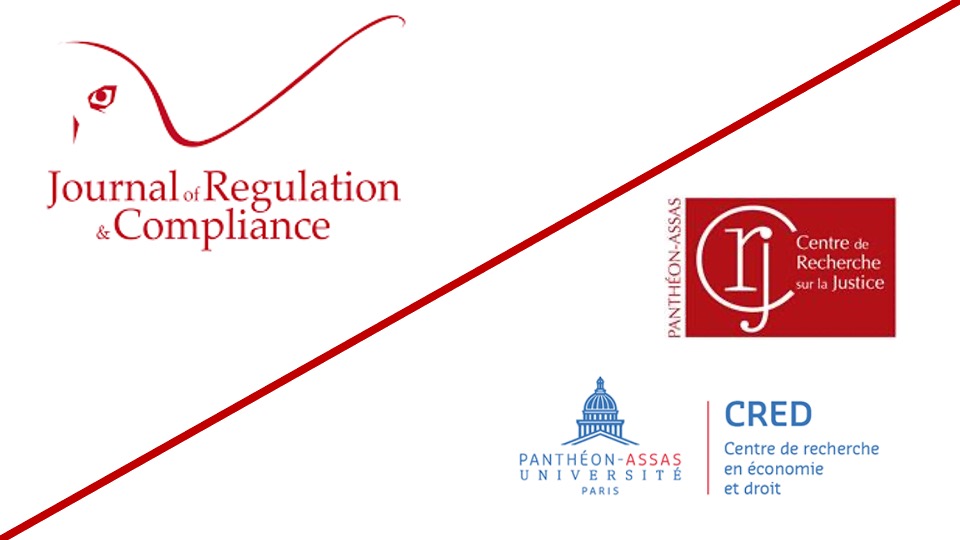
____
🏗️ This symposium takes place in the cycle of symposiums organised by the Journal of Regulation & Compliance (JoRC) and its partner Universities, focusing in 2023 on the general theme of Compliance Obligation.

► This symposium is organised by the Journal of Regulation & Compliance (JoRC) and the University of Panthéon-Assas (Paris II), through its Centre de recherche sur la justice et le règlement des conflits (CRJ) and its Centre de recherches en économie et droit (CRED).
This symposium is held in French.
the symposium is under the scientific direction of 🕴️Bruno Deffains,🕴️Marie-Anne Frison-Roche and 🕴️Jean-Baptiste Racine.
To registrer for a physical presence: anouk.leguillou@mafr.fr (the number of places is limited, you will be asked to confirm 48 hours before).
To register for a online presence: Click HERE
🧮The event takes place in the buildings Salle des Conseils of the Panthéon-Assas University (Paris II), Place du Panthéon, 12, 75005 Paris, on 14 June 2023 from 9:00 to 18:30.
____
► Presentation of the theme: "The "Obligation" is at the heart of many disciplines. Compliance techniques very often take the form of obligations. But to mention only the first questions that come to mind and in cases, especially those that are referred to the courts, it is paradoxically not so much Contract Law and Tort Law that have been used, since Compliance Law is on the one hand often assimilated to the mass of applicable regulations and its unilaterality characteristic of Regulatory Law, the branch of Law that Compliance Law extends, and on the other hand it is often associated with ethics, morality, a shared culture, everything that seems to distance it from Obligation.
The notions of "duty" and "commitment" are increasingly taking their place in Compliance Law, although their scope is still uncertain. This is why, beyond the multiplicity of "compliance obligations", one may ask whether there is an "obligation to comply", what its definition would be and its relationship with everything that, in Compliance Law, is not one obligation.
It is the topic of this conference and the articles that will follow to identify what will be this hypothesis, which is becoming more and more frequent and could become the standard.
____
Method chosen to deal with the topic: For contributing to what will later become the book on the Compliance Obligation, constituting its first chapter aimed at identifying what could be a definition of Compliance Obligation, the method is not to start from the legal instruments of compliance but rather for each of the contributors to draw on their discipline, which they has mastered technically, in order to project it and formulate what, on the basis of this previous mastery and according to his or her own conception, is or should be, or should not be, the Compliance Obligation.
Each speaker gives a half-hour presentation on his topic, which is followed by a 15-minute debate.
____
The proceedings of this colloquium will form the basis of the first chapter in the books:
📕L'obligation de Compliance, in the collection 📚Régulations & Compliance, copublished by the Journal of Regulation & Compliance (JoRC) and Dalloz.
📘Compliance Obligation, in the collection 📚Compliance & Regulation, copublished by the Journal of Regulation & Compliance (JoRC) and Bruylant.
____
Speakers:
🎤Jean-Sébastien Borghetti, professor of Law at the Panthéon-Assas University (Paris II)
🎤Louis d'Avout, professeur à l'Université Paris Panthéon-Assas (Paris II)
🎤Bruno Deffains, professor of Law & Economics at the Panthéon-Assas University (Paris II)
🎤Benoît Frydman, professor at the Université Libre de Bruxelles (ULB)
🎤Marie-Anne Frison-Roche, professor of Regulation & Compliance Law, director of the Journal of Regulation & Compliance (JoRC)
🎤Daniel Gutmann, professor at the Law School of the Panthéon-Sorbonne University (Paris I)
🎤Anne-Valérie Le Fur, professor at the Saclay University
🎤Gilles Lhuilier, professor at the ENS of Rennes, director of the department Droit, Economie, Gestion
🎤Etienne Maclouf, professor of gestion at the Panthéon-Assas University (Paris II)
🎤Stéphane Mouton, professor of Law at the Toulouse 1-Capitole University
🎤Jean-Baptiste Racine, professor of Law at the Panthéon-Assas University (Paris II)
🎤René Sève, director of the Association française de philosophie du droit - AFPD and of the Archives de Philosophie du Droit - APD
🎤Marta Torre-Schaub, director of research at the CNRS, Institute of legal and philosophical sciences of the Sorbonne, University Panthéon-Sorbonne (Paris I)
____
🔻 read a detailed presentation of the manifestation below:
April 7, 2023
Events : JoRC
► Full Reference: Journal of Regulation & Compliance (JoRC) and Law Faculty of Perpignan, Le juge face aux clauses et aux contrats de compliance (The Judge facing clauses and contracts of Compliance), Faculty of Perpignan, 7 April 2023.
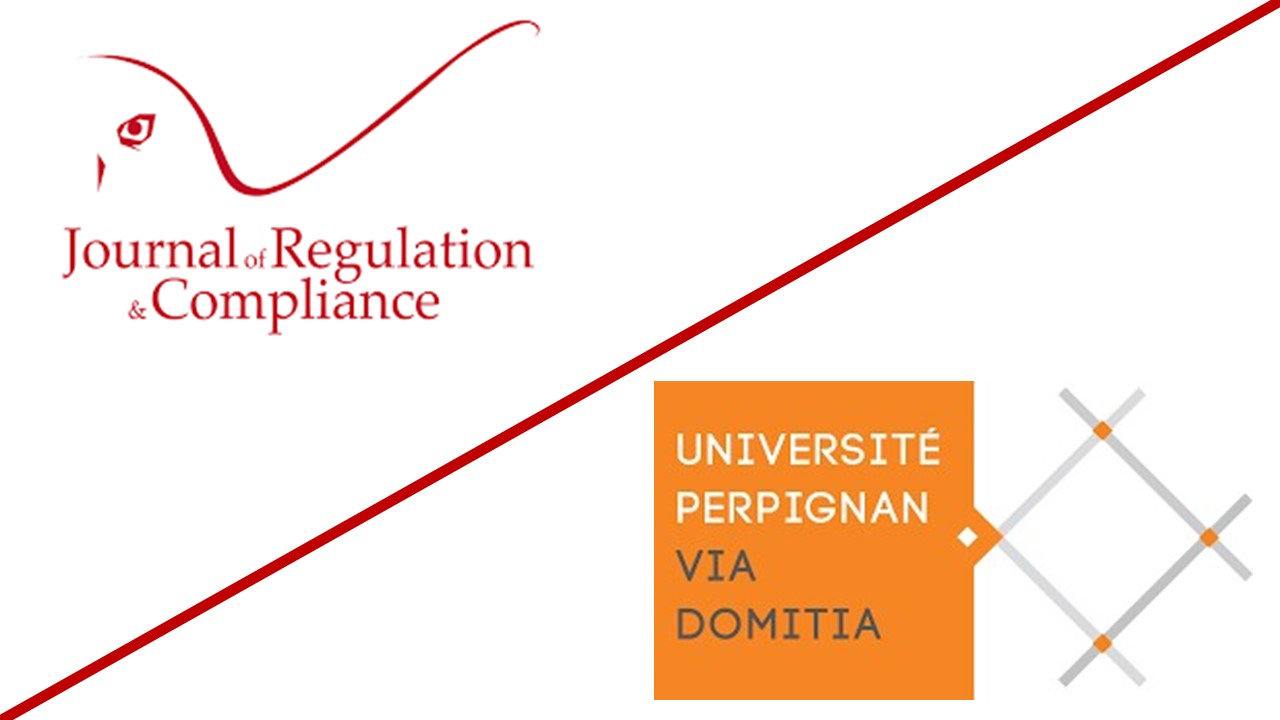
____
🏗️This symposium takes place in the cycle of symposiums organised by the Journal of Regulation & Compliance (JoRC) and its partner Universities, focusing in 2023 on the general theme of Compliance Obligation.

► This symposium is organised by the Journal of Regulation & Compliance (JoRC) and the Law Faculty of the University of Perpignan.
This symposium is held in French.
This symposium is under the scientific direction of 🕴️Walid Chaiehloudj et 🕴️Marie-Anne Frison-Roche.
🧮The event takes place in the premises of the University of Perpignan, on Friday 7 April 2023, from 9:00 to 18:30. It takes place in a hybrid way.
_____
Presentation of the theme:
The Compliance obligation will increasingly take the form of contracts. This is because the texts unilaterally adopted by Public Authorities oblige economic operators to adopt clauses to give concrete form to the legal obligations of Compliance, for instance active prevention of corruption or effective vigilance in the value chain to avoid environmental or human rights violations. It also comes from the fact that companies, for many reasons, commit themselves to contribute to the efficacy achievement of the Monumental Goals of Compliance, with the contract being the most natural, balanced and flexible way to achieve this.
In this multiple contractual activity, which can manifest itself either in complete contracts, "compliance contracts", or in stipulations that more or less deviate from the regulations, the judge is never far away, because the judge is always, regardless of the legal system and the type of contract, active in this matter.
The general relationship between the Judge and Compliance Law has just been the subject of a series of symposiums and the publication of a book, La juridictionnalisation de la Compliance (Compliance Jurisdictionalisation, to be published in English). The aim here is to refocus the perspective on what happens when the judge is facing a contract that has Compliance issues at stake or, at the very least, contains Compliance stipulations.
The purpose of this symposium and the articles that will follow is to study this hypothesis, which is becoming more and more frequent and could become the standard.
_____
Some speakers:
🎤 Sarah Andjechairi-Tribillac, Senior lecturer at University of Perpignan
🎤 Jean-Baptiste Barbieri, Senior lecturer at University Panthéon-Assas (Paris 2)
🎤 Walid Chaiehloudj, Professor at Perpignan University
🎤 Marie-Anne Frison-Roche, Professor of Regulation and Compliance Law, director of the Journal of Regulation & Compliance (JoRC)
🎤 Thibault Goujon-Bethan, Professer at Lyon 3 University
🎤 Nicolas Ida, Senior lecturer at Aix-Marseille University
🎤 Hania Kassoul, Senior lecturer at Côte d'Azur University
🎤 Rebecca Legendre, Professor at Paris Nanterre University
🎤 Grégoire Leray, Professor at Côte d'Azur University
🎤 Yves Picod, Emeritus Professor at Perpignan University
🎤 Marc Segonds, Professor at Toulouse Capitole University
🎤 Sandrine Tisseyre, Professor at Toulouse Capitole University
🎤 Antoine Touzain, Professor at Rouen University
____
The proceedings of this colloquium will form the basis of a specific part in the books:
📕L'obligation de Compliance, in the collection 📚Régulations & Compliance, copublished by the Journal of Regulation & Compliance (JoRC) and Dalloz.
📘Compliance Obligation, in the collection 📚Regulation & Compliance, copublished by the Journal of Regulation & Compliance (JoRC) and Bruylant.
Nov. 4, 2021
Events : JoRC
This scientific event is part of the 2021 colloquium cycle, organized by the Journal of Regulation & Compliance (JoRC) and its Universities partners, around the general theme of Compliance Monumental Goals.
It is organized by the Journal of Regulation & Compliance (JoRC) and by the Paris Center for Law and Economics of the Panthéon-Assas University (Paris II).
This scientific event is placed under the scientific responsibility of Laurent Benzoni, Bruno Deffains and Marie-Anne Frison-Roche.
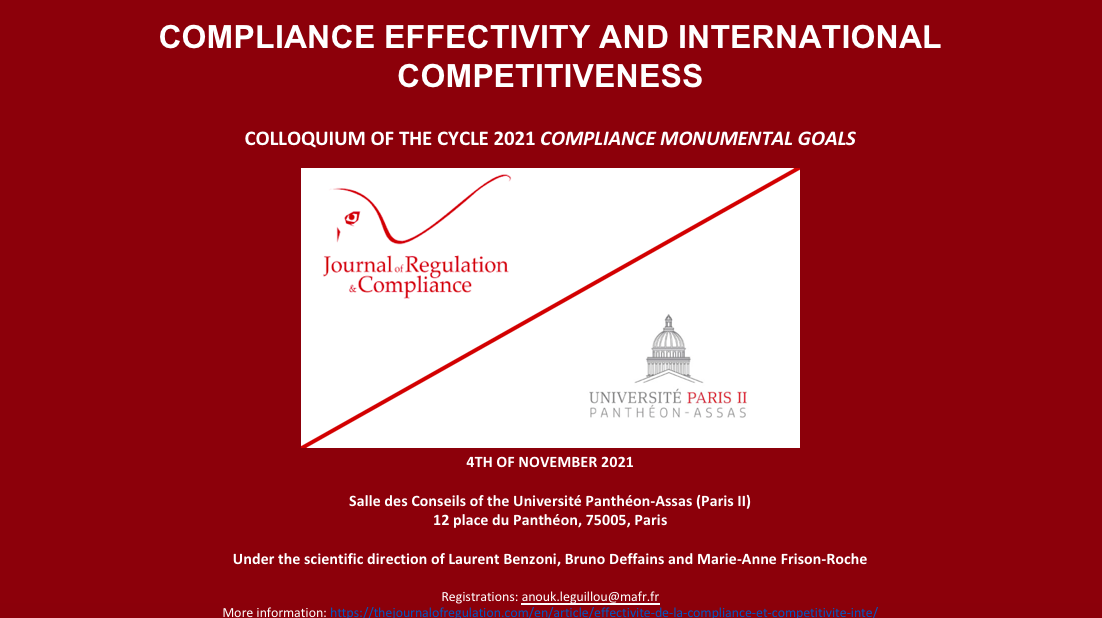
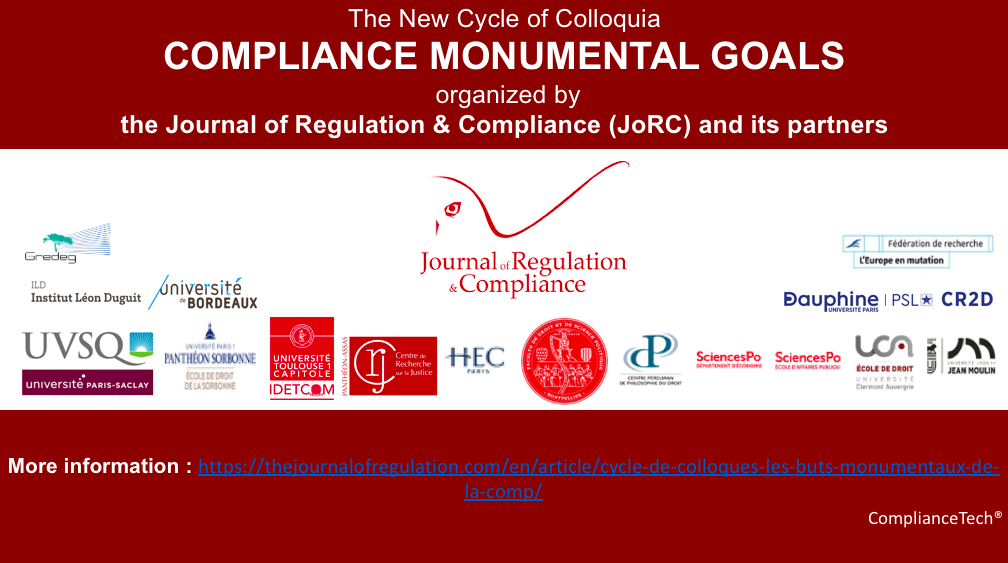
📅 The colloquium will take place in the Salle du Conseil (Panthéon-Assas University) on Thursday, November 4, 2021 from 1.30pm until 6.30pm.
🎥 The colloquium will be edited on video by the Journal of Regulation & Compliance.
Presentation of the topic :
Speakers:
🎤 Laurent Benzoni, professor of Economics at Panthéon-Assas University (Paris II), Tera Consultants
🎤Bruno Deffains, professor of Economics at Panthéon-Assas University (Paris II), director of the CRED
🎤 Marie-Anne Frison-Roche, Law professor at Sciences Po - Paris, director of the JoRC
🎤 Antoine Gaudemet, Law professor at Panthéon-Assas Université (Paris II), director of the Compliance Officer D.U.
🎤 Sabine Lochmann, CEO of Vigeo Eiris, Global Director of Moody’s ESG Solutions
🎤Frédéric Marty, economist, researcher at CNRS, member of GREDEG Côte d'Azur University
🎤 Stanislas Pottier, senior advisor to the General Management, Amundi
🎤 Jean-Christophe Roda, Law professor at Lyon 3 University
The different interventions will be then transformed into contributions in the books 📕 Les buts monumentaux de la Compliance and 📘 Compliance Monumental Goals which will be published in the Regulation & Compliance serie, jointly published by the JoRC and Dalloz for the French edition and by JoRC and Bruylant for the book in English.
Read a detailed presentation of the colloquium below:
Oct. 14, 2021
Events : JoRC
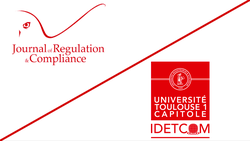
►This scientific manifestation is placed under the scientific responsibility of Marie-Anne Frison-Roche and Lucien Rapp.
This manifestation is organized by the Journal of Regulation & Compliance (JoRC) and by the IDETCOM of Toulouse-I-Capitole University.
📅 This colloquium is part of the cycle of colloquia organized in 2021 around the general topic about Compliance Monumental Goals
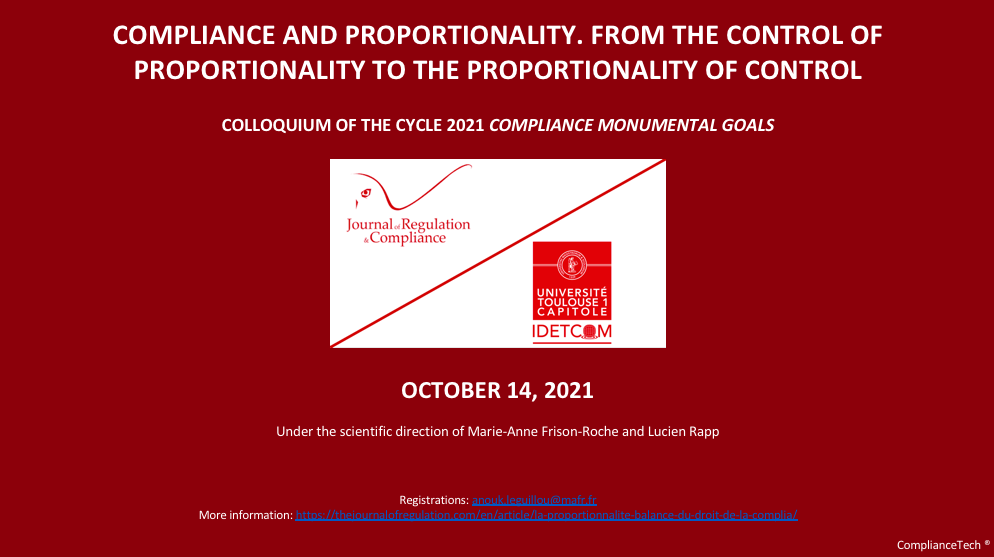

____
► Interventions during this colloquium will be the base for a specific chapter in :
📕 Les buts monumentaux de la Compliance, 
📘Compliance Monumental Goals, 
____
The colloquium will take place, a priori, on site in Toulouse, on October 14, 2021.
It will be broadcasted in live online.
🎥 Videos will be extracted.
► Presentation of the topic :
Compliance Law tends towards "Monumental Goals". This puts the concern, the calculation and the control of proportionality at the center. Proportionality is one of the most common references for compliance practices and strategies, but paradoxically, one of the least well defined. Perhaps even one of the most elusive.
For the German Federal Constitutional Court in Karlsruhe, the principle of proportionality allows the quantitative easing policies of the European Central Bank (ECB) to be monitored. This principle is linked to nothing less than the principle of democracy and is the basis of the control of ultra vires. In French law, proportionality refers to the provisions of Article 8 of the Déclaration des droits (Bill of Rights) of 1789, according to which the law should only establish penalties that are strictly and obviously necessary. In many areas of civil or business life, the compliance of behavior and the consequences of non-compliance are assessed on the basis of a graded assessment by the censor (competitor, regulator or judge).
Proportionality calls for action, which opens up a margin of appreciation to take into account the facts or circumstances. It also allows for the exercise of control over abuse of rights or excess of power. It goes beyond the office of the judge or the censor to forge one of its tools: the control of proportionality, which is obviously not the proportionality of the control.
How to integrate proportionality into compliance practices and strategies?
Does it introduce a certain tolerance in the assessment of situations and is it thus a factor of rediscovered freedom in the development of risk matrices?
Conversely, is it not synonymous with increased vigilance on the part of compliance officers, by leaving open the possibility of a reinforced control of their acts or decisions, by the evaluation of their advisability and not of their conformity alone?
► Working method:
🚧 The colloquium is built around 4 topics, which would be prepared in 4 working papers.
🚧 The writing of each working paper will have been entrusted by experts.
Secondly, these working papers will be available to be criticized by two practionners of Compliance technics.
For each topic, there will be these three sequences:
- Presentation of the topic by the author of the working paper ;
- Discussion by the two discussants, who will have read the working paper previously ;
- Discussion with the public onsite and online.
The four topics chosen are:
1️⃣ Proportionality and Conformity
2️⃣ Proportionality and Evaluation
3️⃣ Proportionality and Normativity
4️⃣ Proportionality and Sanction
► registrations and information :
- attendance to the manifestation is free, onsite or online
- every registration for an attendance onsite will be supported by Toulouse-I-Capitole University
- information will be available on a website opened by Toulouse-I-Capitole University
____
►Will speak, notably :
🎤 Marie-Anne Frison-Roche, professor of Regulation and Compliance Law, director of the Journal of Regulation & Compliance
🎤 Alexandra Mendoza-Carminade, professor at Toulouse-I-Capitole University
🎤Lucien Rapp, professor at Toulouse-I-Capitole University
🎤 Marc Segonds, professor at Toulouse-I-Capitole University
____
See the program below:
Oct. 14, 2021
Events : JoRC
This scientific event is placed under the scientific responsibility of Marie-Anne Frison-Roche and Arnaud van Waeyenberge. It is organized by the Journal of Regulation & Compliance (JoRC) and by the Centre Perelman of Brussels University.
This event is part of the 2021 colloquia cycle around the general theme of Compliance Jurisdictionalisation.
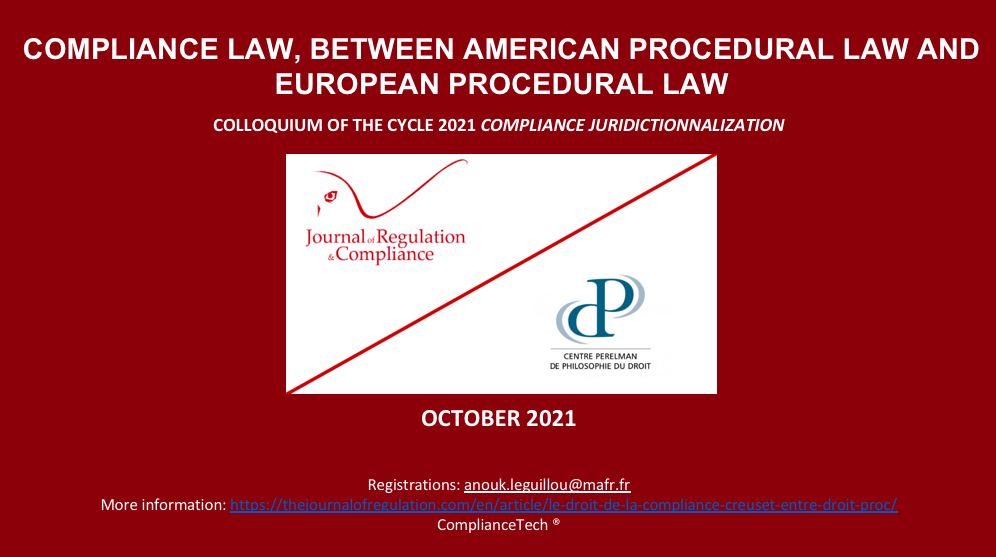
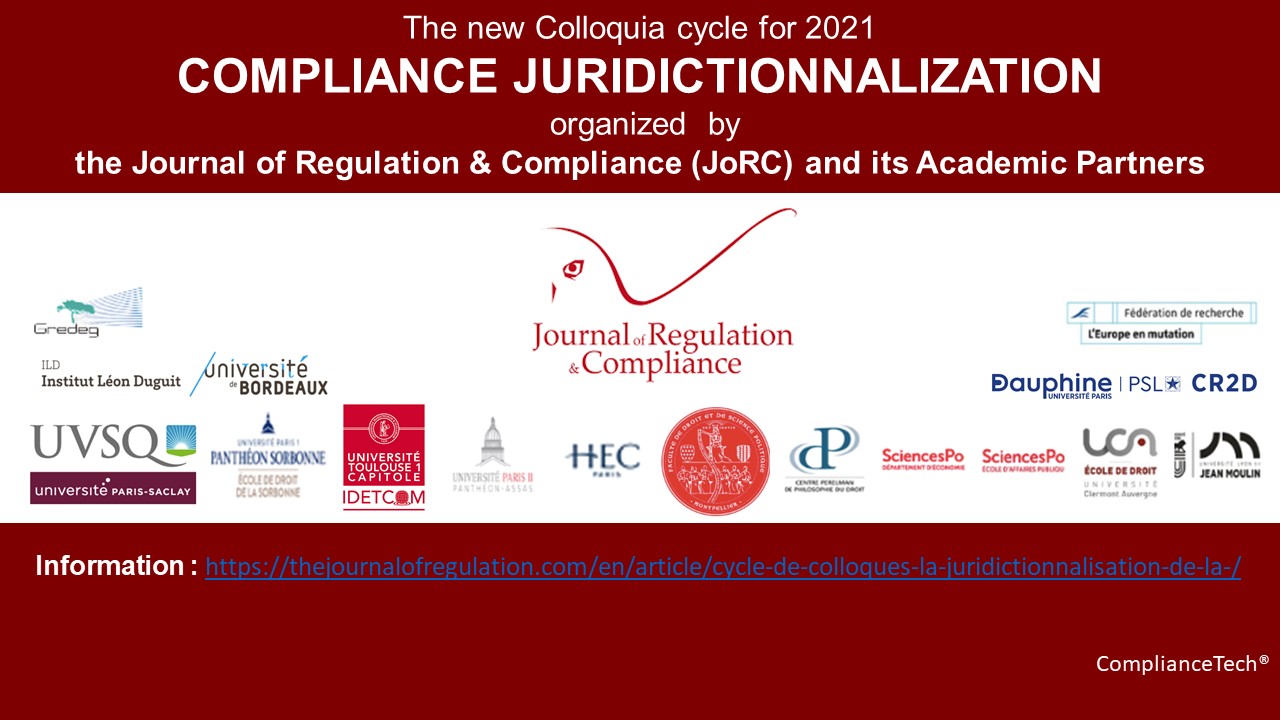
The different interventions will be then transformed into contributions in the books La juridictionnalisation de la Compliance and Compliance Juridictionnalization which will be published in the Regulation & Compliance serie, jointly published by the JoRC and Dalloz for the book in French and by JoRC and Bruylant for the book in English.
This colloquium will take place in Brussels in October 2021.
Presentation of the theme:
Notably will speak:
- Marie-Anne Frison-Roche, professor at Sciences Po - Paris
- Arnaud van Waeyenberge, professor at HEC Paris and researcher at Centre Perelman
Read a detailed presentation of the colloquium below:
Sept. 23, 2021
Events : JoRC
►This scientific event is placed under the scientific responsibility of Marie-Anne Frison-Roche, Juliette Morel Maroger and Sophie Schiller. It is organized by the Journal of Regulation & Compliance (JoRC) and by the Centre de recherche en Droit (CR2D) of Paris Dauphine-PSL University.
This event is part of the 2021 colloquia cycle around the general theme of Compliance Jurisdictionalisation.
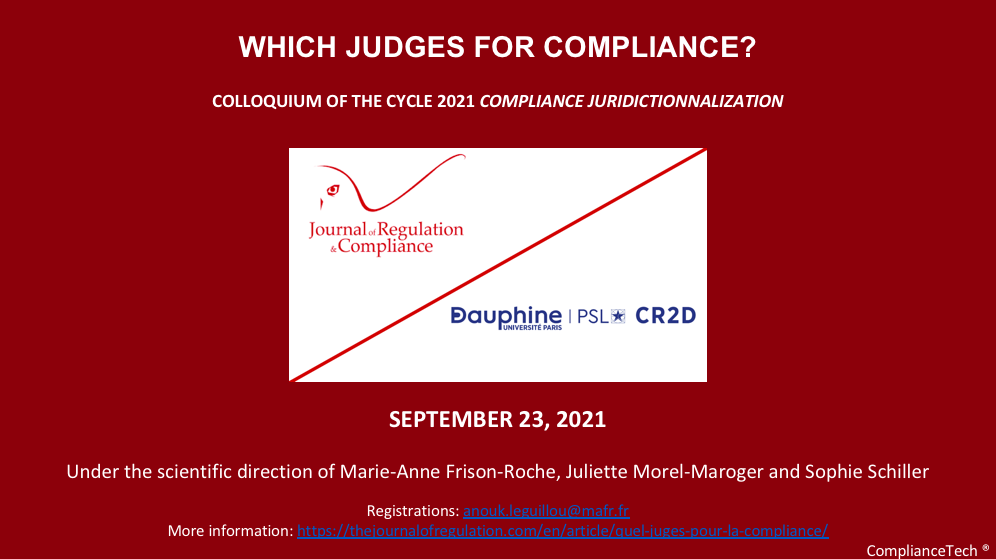

►The interventions will be then transformed into a chapter in the books: contributions in the 📕 La Juridictionnalisation de la Compliance , to be published the Regulation & Compliance series ries, jointly published by the Journal of Regulation & Compliance (JoR)C and Dalloz
📘Compliance Jurisdictionalisation, 
____
This colloquium will take place in Paris Dauphine-PSL University in September 2021.
Presentation of the topic :
Judges, regulatory and supervisory authorities, or even authorities specially instituted by Compliance Law, such as the Agence Française Anticorruption (French Anticorruption Agency), must implement it.
The colloquium aims initially to identify and discuss the procedural rules that they then specifically implement, in particular when the strong requirements of Compliance Law, efficiency and immediacy, new negotiation techniques and commitment, must be articulated with the traditional procedural requirements that remain.
The question arises in particular as to whether the rules of a fair trial should apply (or can they be similar in transactional procedures and in the context of judicial procedures, and how the control by judges operates during homologation) in transactional procedures, with more or less specific treatment of the evidence used.
Secondly, the colloquium considers the way in which the different judges assess the different constitutive standards of Compliance Law. These are often soft Law and depending on whether the judge is repressive, administrative, or European, his or her assessment will not be legally of the same scope or of the same nature, which together leads to an issue of articulation of method. Due to the breadth of the subject, certain sectors will be particularly examined, in particular the banking sector.
Thirdly, the way in which the judge himself or herself applies Compliance Law will be examined, in what appears to be a balance between pedagogy and sanction. It then appears to play a triple role, in that it ensures compliance with standards but also in that it must find effective solutions in a Law which is more in Ex Ante than in Ex Post and that it must support operators so that they act effectively, by mastering their obligations. The motivation for decisions then appears to be a primary issue.
Because this last phase concerns the even more direct relationship between the judge and the operators and stakeholders, this theme is intended to give rise to a presentation and a round table.
______________
Will speak notably:
- Claudie Boiteau, Professor at Paris Dauphine-PSL University, Member of the Centre de Recherche en Droit de l'Université Paris Dauphine-PSL (CR2D).
- Jean-François Bohnert, Financial National Prosecutor
- Olivier Catherine, Secretary General at Sonepar
- Nicolas Cayrol, Professor at Tours Law School and Director of the Institut d'Etudes Judiciaires François Grua
- Jean-Michel Darrois, Attorney, Darrois, Villey, Maillot, Brochier Law Firm
- Marie-Laure Denis, President of the CNIL
- Eric Dezeuze, Attorney, Bredin Prat Law Firm
- Marie-Anne Frison-Roche, Professor at Sciences Po (Paris), Director of the JoRC
- Juliette Morel-Maroger, Professor at Paris Dauphine-PSL University
- Sophie Scemla, Associate attorney, Gide Law Firm
- Sophie Schiller, Professor at Paris Dauphine-PSL University
Read a more detailed presentation below:
Sept. 15, 2021
Events : JoRC
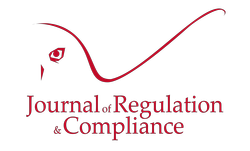
This scientific manifestation is placed under the scientific responsibility of Marie-Anne Frison-Roche. It is organized by the Journal of Regulation & Compliance (JoRC).
It constitutes the inaugural colloquium of the cycle of colloquia in 2021 on the general topic Compliance Jurisdictionalisation.
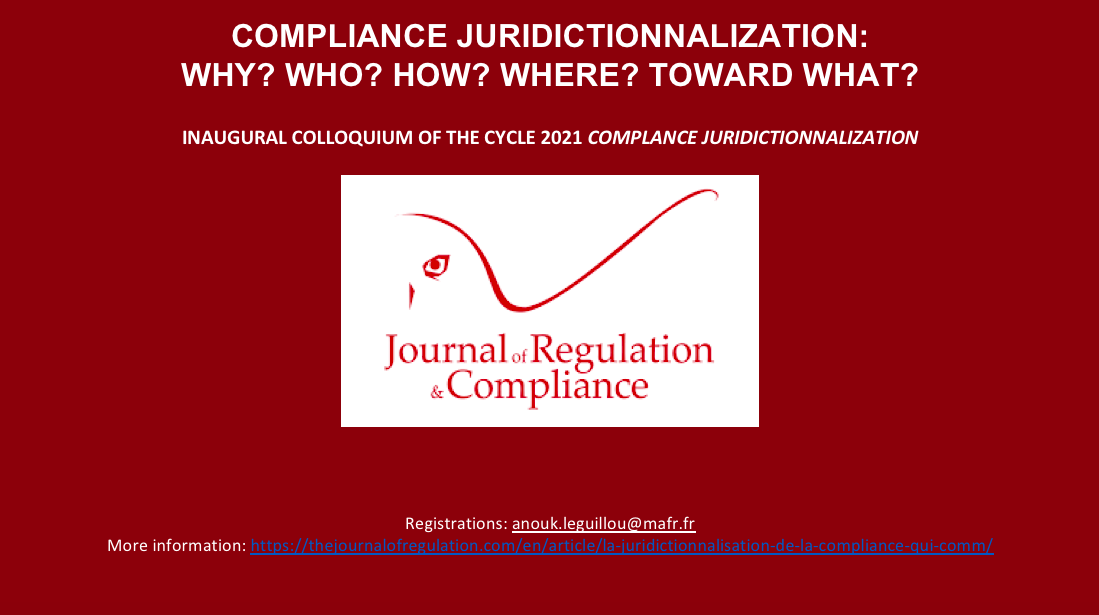

The work will then be incorporated into the two books La juridictionnalisation de la Compliance and Compliance Jurisdictionalization which will be published in the Regulations & Compliance series, co-edited by the JoRC with Dalloz for the book in French and with Bruylant for the book in English.
This colloquium will be held in Paris in 2021.
Presentation of the topic: Because Compliance Law is the extension of Regulatory Law, it is experiencing the same movement of Juridictionnalisation. First of all conceived as the goal of protecting systems and people, even if they seem beyond reach, this has led to the establishment of private companies as judges of themselves, to be structurally the judges and judged, those who act and those who observe. The duty of vigilance has increased this transformation. As in Regulatory Law, which is an Ex Ante branch of Law, the procedure, which is an Ex Post branch of Law, governs the functioning of companies, transfiguring Company Law under the term "governance".
The shock and transformation once received by Administrative Regulatory Authorities has been heightened by the fact that companies have been further seized by the repressive Courts on the one hand and by an American repressive Law on the other hand, two different cultures. There are therefore many technical difficulties that must first be identified and formulated and then resolved. The easiest is in a first step to ask the following questions : Why? Who? How? When? Where? Toward What?
June 23, 2021
Events : JoRC
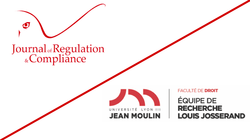
►This scientific manifestation is placed under the scientific responsibility of Marie-Anne Frison-Roche and Jean-Christophe Roda. It is organized by the Journal of Regulation & Compliance (JoRC) and the Centre de Droit de l'Entreprise of Lyon 3 University.
📅 It is one of the colloquia of the cycle of colloquia organized in 2021 around the general topic of Jurisdictionalisation of Compliance.

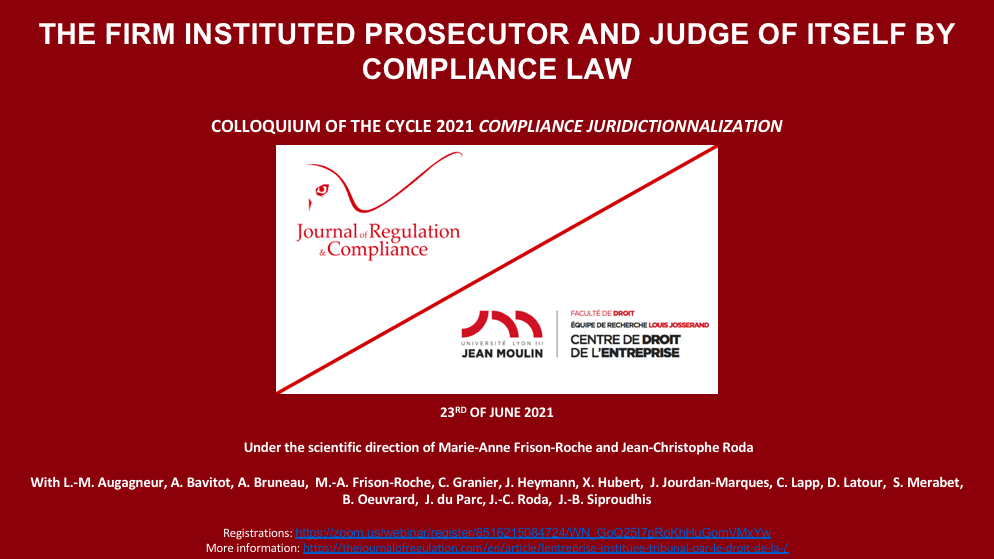
►The interventions will be then transformed into a chapter in the books:
📕 La Juridictionnalisation de la Compliance ,
📘Compliance Jurisdictionalisation, 
____
This colloquium will take place in Lyon 3 on 23rd of June 2021 with a limited audience. It will also be broadcasted in live on Zoom.
To register: https://zoom.us/webinar/register/8516215084724/WN_GoQ25I7pRoKhHuGomVMxYw
► Presentation of the topic: Initially, it was through Criminal Law, inseparable from the trial, which forced companies to take charge of monitoring within themselves behavior likely to be deviant, the requirement of Ex Ante to be designed by the 'Ex Post of the jurisdictional. From this reversal of things, there has always remained this presence of the judge and the prosecution bodies in a Compliance Law which is nevertheless defined by its concern for the future and the Ex Ante tools within the company.
In doing so, the company becoming on the one hand a judge of itself, on the other hand a prosecutor of itself, it splits up, taking in reverse the most established procedural principles. Moreover, because of the monumental goals which constitute Compliance Law, companies become attorneys and judges of the others, or for the others, the cutting machines and the "supreme courts" being by name instituted to regulate in Ex Ante all different before that it does not become litigation. The Ex Ante of Compliance would then make the Ex Post disappear.
► Method:
The colloquium which had to take place initially on 8th of April has been postponed to 23rd of June to enable speakers to meet and talk in face to face, with a limited audience.
These exchanges will be captured so that third parties can benefit from them, even before the publication of the works, La Juridictionnalisation de la Compliance and Compliance Juridictionalization, within which this work constitutes the basis for the development of a specific chapter.
Five practical cases will first be examined in five specific sectors, where this institution of the firm as prosecutor and judge of itself is particularly observable before both specific and more cross-sectoral themes are examined and discussed.
►speakers :
🎤 Luc-Marie Augagneur, Attorney before Lyon Court of Appeal, CVS Law Firm
🎤Ale xis Bavitot, Senior lecturer at Lyon 3 University
🎤 Alain Bruneau, Chief compliance officer at Natixis
🎤 Jean-Marc Coulon, Head of Legal Infrastructure at Bouygues Construction
🎤 Marie-Anne Frison-Roche, Director of the Journal of Regulation & Compliance (JoRC)
🎤 Cécile Granier, Senior lecturer at Lyon 3 University
🎤 Xavier Hubert, Director of Compliance at Engie
🎤 Jérémie Jourdan-Marques, Professor at Lyon 2 University
🎤 Jérémy Heymann, Professor at Lyon 3 University
🎤 Daphnée Latour, Attorney, DL Avocats, Paris
🎤 Christophe Lapp, Founding partner of Altana law firm
🎤 Samir Merabet, Senior lecturer at Lyon 3 University
🎤 Béatrice Oeuvrard, Public Policy Manager at Facebook France
🎤 Jean du Parc, Bâtonnier
🎤 Jean-Christophe Roda, Professor at Lyon 3 University and director of the Centre de droit de l'entreprise (Center of Company Law)
🎤 Jean-Baptiste Siproudhis, Director Ethics, Integrity and CSR at Thalès
May 17, 2021
Events : JoRC
This scientific manifestation is placed under the scientific direction of Marie-Anne Frison-Roche, Pascale Idoux, Antoine Oumedjkane and Adrien Tehrani. It is organized by the Journal of Regulation & Compliance (JoRC) and by the Faculté de Droit et de Science Politique de l'Université de Montpellier (Centre de Recherches et d'Etudes Administratives de Montpellier and Centre du Droit de l'Entreprise).
📅 This manifestation is part of the cycle of colloquia organized in 2021 around the general topic of Compliance Monumental Goals.
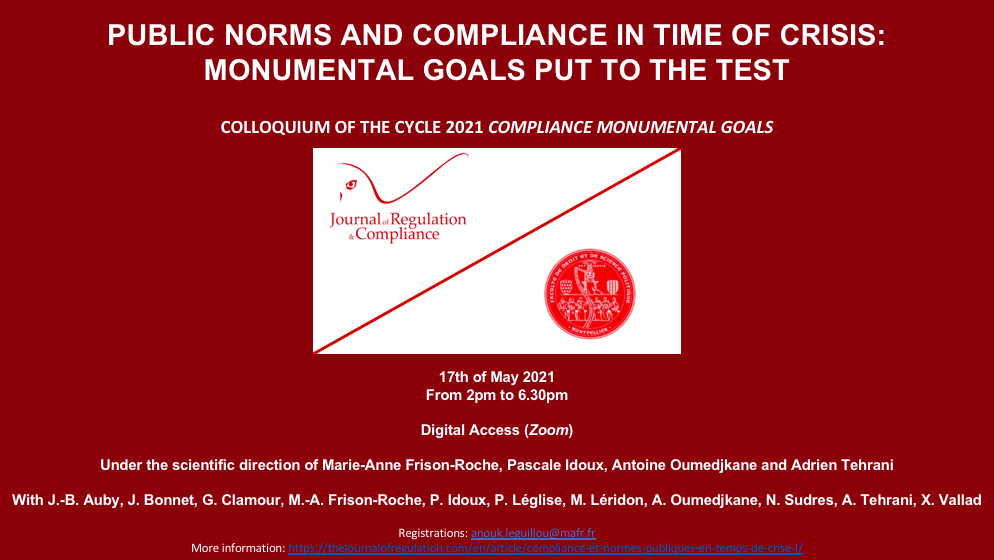

The interventions will give rise to the production of articles which will be part of
📕 Les bus monumentaux de la Compliance, 
📘Compliance Monumental Goals, 
This manifestation took place on Zoom on 17th of May 2021.
Registrations: anouk.leguillou@mafr.fr
Assistance to this event may be validated as part of the continuing education of lawyers.
In addition, scientific videos will be extracted and disseminated later.
Presentation of the topic: In the overall problematic of "Monumental goals", this conference retains a particular case: that of the crisis and the emergency situation that it generates.
First of all, in general, does the importance of public norms in the emergency context engendered by a crisis situation imply a marginalization of Compliance? Don't private actors also have their place in these circumstances, at the service of the "monumental goals" that the public authorities want to maintain, or even which appear specifically?
Secondly, more concretely, we have been living for many months in a health crisis. By taking it as a framework and, within it from particular cases, how public and private actors react, act, adjust? and how do the courts assess these movements?
Going from the most general to the most specific, this conference aims to identify criteria, limits, of what could be specific rules when the emergency of a crisis meets Compliance, and will examine specific situations.
Working method: The conference is therefore built on a general issue, which was the subject of a "working paper", written by Antoine Oumedjkane, Adrien Tehrani and Pascale Idoux, on which the speakers will have thought in advance and from which they are intended to study the question from their particular perspective.
The conference, which is essentially interactive, therefore begins with an outline of the main lines of this general work. It is followed by the examination of concrete practical cases.
They are as follows:
1️⃣ hydro-alcoholic gel, its manufacture, price, availability,
2️⃣ information and regulation on all media in Covid period
3️⃣ the use of the bicycle during the state of health emergency
A first conclusion, thematically limited, will relate to Revealed by the crisis situation, the place of private initiative in Compliance Law.
A second, more general, undoubtedly open-ended conclusion is drawn from this confrontation between general reflection and concrete cases which must be resolved in a particular crisis.
speakers:
🎤 Jean-Bernard Auby, Emeritus Professor of Sciences po (Paris)
🎤 Julien Bonnet, Professor at Montpellier University and member of the CERCOP
🎤 Guylain Clamour, Dean of Montpellier Law School
🎤 Marie-Anne Frison-Roche, agrégée des Facultés de droit, Professor of Regulation and Compliance Law at Sciences Po (Paris) and Director of the Journal of Regulation & Compliance (JoRC)
🎤 Pascale Idoux, Professor at Montpellier University
🎤 Pascale Léglise, adjointe au directeur des libertés publiques et des affaires juridiques (Deputy Director of Civil Liberties and Legal Affairs) of the Ministère de l'intérieur (Home Ministry)
🎤 Michèle Léridon, Member of the Conseil supérieur de l'audiovisuel (French Media Regulator), President of the working group Pluralisme, déontologie, supervision des plateformes en ligne (Pluralism, Deontology, Supervision of Online Platforms)
🎤 Antoine Oumedjkane, Researcher of the Centre de recherche et d'études administratives (Research and Administrative Studies Center) of Montpellier University
🎤 Nelly Sudres, Maître de conférences at Montpellier University and member of the Centre de Recherches et d'Etudes Administratives (Research and Administrative Studies Center) of Montpellier University
🎤 Adrien Tehrani, Professor at Montpellier University and member of the Centre du Droit de l'Entreprise (Company Law Center)
🎤Xavier Vallad, Group Legal Director, Intermarché
⤵️Read a more detailed presentation of the manifestation below:
March 31, 2021
Events : JoRC
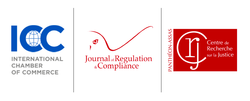
This scientific event is placed under the scientific responsibility of Marie-Anne Frison-Roche and Jean-Baptiste Racine. It is organized by the Journal of Regulation & Compliance (JoRC) and by the Centre de recherche sur la Justice et le Règlement des Conflits (CRJ) of the Panthéon-Assas (Paris II) University, with the active support of the International Chamber of Commerce ICC.
This event is the third colloquium of the 2021 colloquia cycle around the general theme of Compliance Jurisdictionalisation.
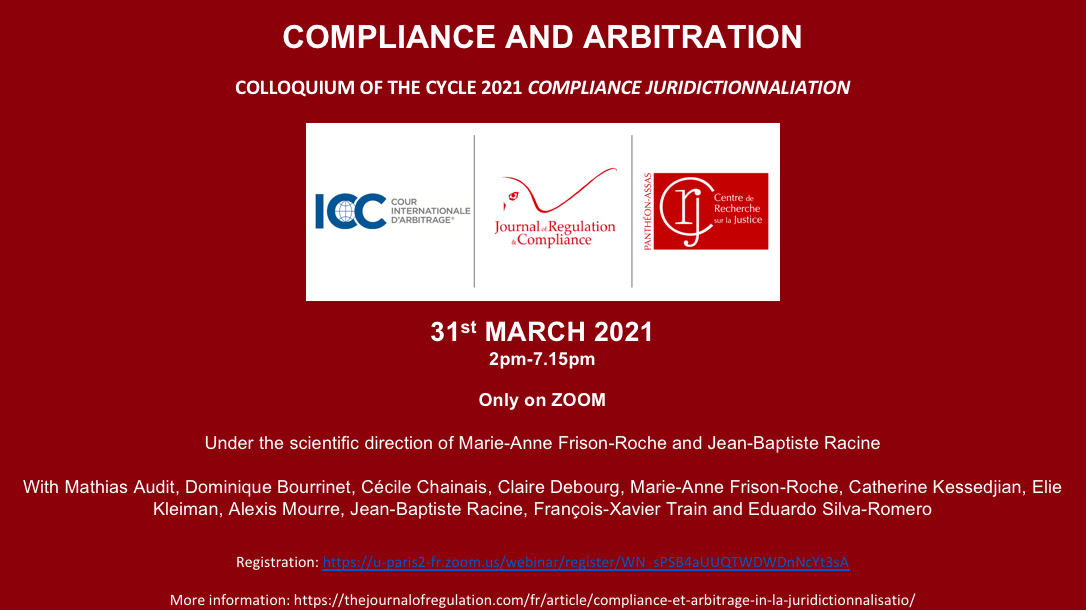

►The interventions will be then transformed into a chapter in the books: contributions in the 📕 La Juridictionnalisation de la Compliance , to be published the Regulation & Compliance series ries, jointly published by the Journal of Regulation & Compliance (JoR)C and Dalloz
📘Compliance Jurisdictionalisation, 
____
This colloquium took place the 31st of March 2021.
The manifestation was live broadcasted on Zoom.
Presentation of the theme:
The arbitrator is the ordinary judge of international trade. It was natural that he or she encountered Compliance: by definition Compliance Law takes hold of the whole world and follows the paths of international trade while it can only be deployed with the help of institutions which, by nature are spreading around the world and need authorities like the Courts.
The conference is based on the already perceptible connection points between Compliance and Arbitration to better identify what is emerging for tomorrow: contradiction or convergence between the two; weakening or consolidation. We are already seeing the impact that Compliance can have on the arbitrator's treatment of corruption or the consideration of money laundering. More generally, where do we stand with the arbitrator's knowledge of the many technical issues related to compliance? Beyond these, will the courts and arbitrators be able to achieve the goals, themselves new, sometimes monumental, pursued by Compliance Law?
Through this joint exploration of these avenues, the fate of compliance clauses inserted in contracts, the relevance in the matter of private codes of conduct, etc. will be examined.
Tomorrow, as of today, is the arbitrator a full and complete judge of Compliance Law?
How, with what specificities and what controls?
Notably will speak:
- Mathias Audit, professeur à l'Université Panthéon-Sorbonne - Paris I (full professor at Sorbonne - University - Paris)
- Dominique Bourrinet, General Counsel of Société générale group
- Cécile Chainais, director of the Centre de Recherche sur la Justice et le Règlement des Conflits (CRJ) and professeur à l'Université Panthéon-Assas (Paris II) (Full professor at Panthéon-Assas (Paris II) University)
- Claire Debourg, professeure à l'Université Paris X- Nanterre (Full professor at Paris X - Nanterre)
- Marie-Anne Frison-Roche, professeur à Sciences Po - Paris (Full Professor at Sciences Po - Paris)) and Director of the Journal of Regulation & Compliance (JoRC)
- Catherine Kessedjian, professeur émérite de l'Université Panthéon-Assas (professor emeritus of Panthéon-Assas - Paris II University)
- Elie Kleiman, partner, Jones Day Law Firm
- Alexis Mourre, president of the ICC International Court of Arbitration
- Jean-Baptiste Racine, professeur à l'Université Panthéon-Assas - Paris II (Full Professor at Panthéon-Assas - Paris II University)
- François-Xavier Train, professeur à l'Université Paris X-Nanterre (Full Professor at Paris X-Nanterre University)
- Eduardo Silva-Romero, Dechert Law Firm
Read a detailed presentation of the colloquium below:
Oct. 26, 2020
Events : JoRC

Like the previous cycles devoted to the general theme of Compliance and aiming to build a "Compliance Law", intended like them to be published in the Regulations & Compliance collection, this cycle addresses a particular aspect of this branch of Law in progress. to develop. "Compliance tools" having been the subject of the previous cycle of conferences and showing judges, lawyers, jurisdictions, this new cycle addresses a new phenomenon in Compliance: La juridictionnalisation de la Compliance (The jurisdictionalisation of Compliance).
It will take place in parallel with the series of conferences on the theme: Les buts monumental de la Compliance (The monumental goals of Compliance).

There have always been judges and lawyers in Compliance Law, in particular because this is the extension of Regulatory Law in which they have a full place. This results from the fact that the decisions taken in respect of Compliance are contestable in court, those issued by the company, such as those of States or Authorities. The novelty lies more in the phenomenon of "legalization", that is to say that the jurisdictional model penetrates all Compliance Law, and not only the Ex Post part that this includes. Furthermore, it seems that this jurisdictionalization influences the non-legal dimension of Compliance. This movement has effects that must be measured and causes that must be understood. Advantages and disadvantages that must be balanced. If only to form an opinion on this "juridictionalization of Compliance".
📅 Inaugural colloquium: Compliance jurisdictionalisation: why? Who? How? Where? and Toward What? , organized by the JoRC under the scientific direction of Marie-Anne Frison-Roche : read more information here
📅 Colloquium of March 31, 2021 : Arbitration and Compliance, co-organized by the JoRC and Paris II University, under the scientific direction of Marie-Anne Frison-Roche and Jean-Baptiste Racine : read more information here
📅 Colloquium of June 23, 2021 : The firm instituted as Court by Compliance Law, co-organized by the JoRC and the équipe de recherche Louis Josserand of Lyon 3 University, under the scientific direction of Marie-Anne Frison-Roche and Jean-Christophe Roda : read more information here
📅 Colloquium of September 23, 2021 : Which judges for Compliance? , co-organized by the JoRC and the CR2D of Paris-Dauphine University, under the scientific direction of Marie-Anne Frison-Roche and Sophie Schiller : read more information here
📅 Colloquium of October 2021 : Compliance Law, crucible between American Procedure Law and Procedure Law, co-organized by the JoRC and the Brussels University, under the scientific direction of Marie-Anne Frison-Roche and Arnaud van Waeyenberge: read more information here
Technical registration modes are specific to each colloquium.
The Journal of Regulation & Compliance (JoRC) benefits from the partnership of :
🏫 L’École d’Affaires Publiques de Sciences Po,
🏫 Le Département d’Économie de Sciences Po,
🏫 L' École de Droit de l'Université Panthéon-Sorbonne (Paris I),
🏫 L’École doctorale de Droit privé de l'Université Panthéon-Assas (Paris 2),
🏫 La Faculté de droit et de sciences politiques de l'Université de Montpellier
🏫 Le Centre Perelman de l'Université Libre de Bruxelles,
🏫 Le GREDEG de l'Université de Nice,
🏫 La Fédération de recherche "L'Europe en mutation" de l'Université de Strasbourg
🏫 Le Centre Louis Josserand de la Faculté de Droit de Lyon III.
🏫 La Faculté de droit et de sciences politiques de l'Université de Toulouse-I-Capitole,
🏫 L'école de droit de l'Université de Clermont-Ferrand.
🏫 Le centre de recherche Droit-Dauphine de l'Université Paris-Dauphine
🏫 L'École des hautes études commerciales de Paris (HEC Paris)
The cycle is supported by :
Aug. 31, 2020
Events : JoRC

Like the previous cycles devoted to the general theme of Compliance and aiming to build a "Compliance Law", intended like them to be published in the Regulations & Compliance collection, this cycle addresses a particular aspect of this branch of Law in progress. to develop, which was applied even before it was conceived. The Compliance mechanisms having preceded the conceptualization of this way of doing things, the "Compliance Tools" having been the subject of the previous cycle of conferences, this new cycle addresses what characterizes Compliance : Les buts monumentaux de la Compliance (Monumental Goals of Compliance) .
This cycle of scientific manifestation will take place in parallel with the cycle of conferences on the theme of La juridictionnalisation de la Compliance (Juridictionalisation of Compliance)
.
The notion of "monumental goals" was proposed in 2016!footnote-139. It is central in the compliance mechanisms in that they can only claim to constrain and cost those in which they are inserted in that they tend to achieve goals whose substantial quality is to be "monumental" . This notion is not self-evident, having to be justified, detailed, put into perspective and concretely illustrated, a series of conferences organized by numerous universities is therefore devoted to it.
These various conferences will be held in several places, according to the part taken by the various university structures which bring their support to the Journal of Regulation & Compliance (JoRC) for the realization of the cycle. This will result in two collective books, one in French: Les buts monumental de la Compliance, the other in English: Compliance Monumental Goals.
This cycle of colloquia Compliance Monumental Goals will take place between April 2021 and November 2021.
📅 Colloquium of May 17, 2021: Public norms and Compliance in time of crisis: monumental goals put to a test, co-organized by the Journal of Regulation & Compliance (JoRC) and the Montpellier University Law School, under the scientific direction of Marie-Anne Frison-Roche, Pascale Idoux, Antoine Oumedjkane and Adrien Tehrani: more information about this manifestation here
📅 Colloquium of September 16, 2021, Compliance Monumental Goals: Radioscopy of a Notion, co-organised by the Journal of Regulation & Compliance (JoRC) and Saclay University, under the scientific direction of Christophe André, Marie-Anne Frison-Roche, Marie Malaurie and Benoît Petit : more information about this manifestation here
📅 Colloquium of October 14, 2021: Compliance and Proportionality, co-organised by the Journal of Regulation & Compliance (JoRC) and the IDETCOM of Toulouse University, under the scientific direction of Marie-Anne Frison-Roche and Lucien Rapp: more information about this manifestation here
📅 Colloquium of November 4, 2021: Effectivity of Compliance and international competitiveness, co-organized by the Journal of Regulation & Compliance (JoRC) and the Centre de recherches en Economie et Droit de l'Université Paris II, under the scientific direction of Laurent Benzoni, Bruno Deffains and Marie-Anne Frison-Roche: more information about this manifestation here
The technical modes of registration are specific to each colloquium.
The Journal of Regulation & Compliance (JoRC) benefits from the partnership of :
🏫 L’École d’Affaires Publiques de Sciences Po,
🏫 Le Département d’Économie de Sciences Po,
🏫 L' École de Droit de l'Université Panthéon-Sorbonne (Paris I),
🏫 L’École doctorale de Droit privé de l'Université Panthéon-Assas (Paris 2),
🏫 La Faculté de droit et de sciences politiques de l'Université de Montpellier
🏫 Le Centre Perelman de l'Université Libre de Bruxelles,
🏫 Le GREDEG de l'Université de Nice,
🏫 La Fédération de recherche "L'Europe en mutation" de l'Université de Strasbourg
🏫 Le Centre Louis Josserand de la Faculté de Droit de Lyon III.
🏫 La Faculté de droit et de sciences politiques de l'Université de Toulouse-I-Capitole,
🏫 L'école de droit de l'Université de Clermont-Ferrand.
🏫 Le centre de recherche Droit-Dauphine de l'Université Paris-Dauphine
🏫 L'École des hautes études commerciales de Paris (HEC Paris)
The cycle is supported by :
